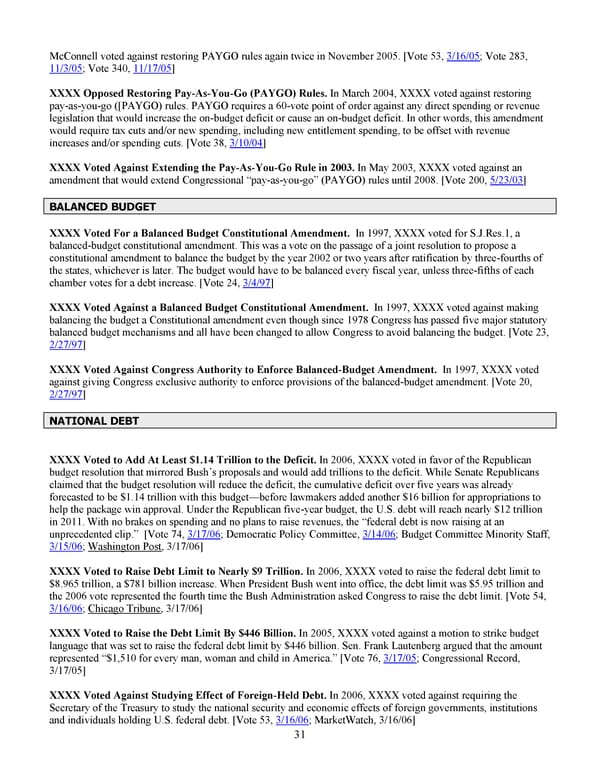McConnell voted against restoring PAYGO rules again twice in November 2005. [Vote 53, 3/16/05; Vote 283, 11/3/05; Vote 340, 11/17/05] XXXX Opposed Restoring Pay-As-You-Go (PAYGO) Rules. In March 2004, XXXX voted against restoring pay-as-you-go ([PAYGO) rules. PAYGO requires a 60-vote point of order against any direct spending or revenue legislation that would increase the on-budget deficit or cause an on-budget deficit. In other words, this amendment would require tax cuts and/or new spending, including new entitlement spending, to be offset with revenue increases and/or spending cuts. [Vote 38, 3/10/04] XXXX Voted Against Extending the Pay-As-You-Go Rule in 2003. In May 2003, XXXX voted against an amendment that would extend Congressional “pay-as-you-go” (PAYGO) rules until 2008. [Vote 200, 5/23/03] BALANCED BUDGET XXXX Voted For a Balanced Budget Constitutional Amendment. In 1997, XXXX voted for S.J.Res.1, a balanced-budget constitutional amendment. This was a vote on the passage of a joint resolution to propose a constitutional amendment to balance the budget by the year 2002 or two years after ratification by three-fourths of the states, whichever is later. The budget would have to be balanced every fiscal year, unless three-fifths of each chamber votes for a debt increase. [Vote 24, 3/4/97] XXXX Voted Against a Balanced Budget Constitutional Amendment. In 1997, XXXX voted against making balancing the budget a Constitutional amendment even though since 1978 Congress has passed five major statutory balanced budget mechanisms and all have been changed to allow Congress to avoid balancing the budget. [Vote 23, 2/27/97] XXXX Voted Against Congress Authority to Enforce Balanced-Budget Amendment. In 1997, XXXX voted against giving Congress exclusive authority to enforce provisions of the balanced-budget amendment. [Vote 20, 2/27/97] NATIONAL DEBT XXXX Voted to Add At Least $1.14 Trillion to the Deficit. In 2006, XXXX voted in favor of the Republican budget resolution that mirrored Bush’s proposals and would add trillions to the deficit. While Senate Republicans claimed that the budget resolution will reduce the deficit, the cumulative deficit over five years was already forecasted to be $1.14 trillion with this budget—before lawmakers added another $16 billion for appropriations to help the package win approval. Under the Republican five-year budget, the U.S. debt will reach nearly $12 trillion in 2011. With no brakes on spending and no plans to raise revenues, the “federal debt is now raising at an unprecedented clip.” [Vote 74, 3/17/06; Democratic Policy Committee, 3/14/06; Budget Committee Minority Staff, 3/15/06; Washington Post, 3/17/06] XXXX Voted to Raise Debt Limit to Nearly $9 Trillion. In 2006, XXXX voted to raise the federal debt limit to $8.965 trillion, a $781 billion increase. When President Bush went into office, the debt limit was $5.95 trillion and the 2006 vote represented the fourth time the Bush Administration asked Congress to raise the debt limit. [Vote 54, 3/16/06; Chicago Tribune, 3/17/06] XXXX Voted to Raise the Debt Limit By $446 Billion. In 2005, XXXX voted against a motion to strike budget language that was set to raise the federal debt limit by $446 billion. Sen. Frank Lautenberg argued that the amount represented “$1,510 for every man, woman and child in America.” [Vote 76, 3/17/05; Congressional Record, 3/17/05] XXXX Voted Against Studying Effect of Foreign-Held Debt. In 2006, XXXX voted against requiring the Secretary of the Treasury to study the national security and economic effects of foreign governments, institutions and individuals holding U.S. federal debt. [Vote 53, 3/16/06; MarketWatch, 3/16/06] 31
 HRC vote skeleton Page 35 Page 37
HRC vote skeleton Page 35 Page 37